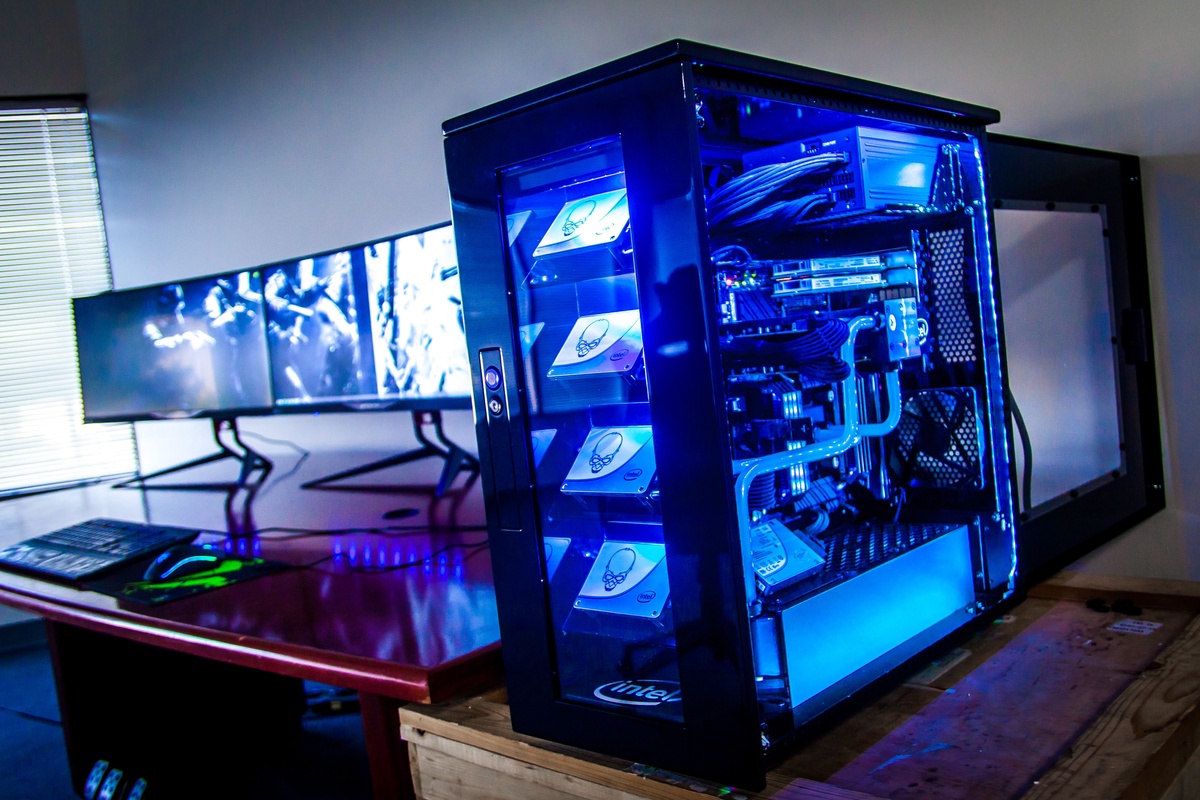Gaming laptops are a popular choice for gamers who want the convenience of portable devices without sacrificing performance. These laptops are specially designed to handle the demands of modern video games and are equipped with powerful graphics cards.
A top gaming laptop is a small, mobile personal computer with built-in screen quality. It’s primarily used to play computer games. The powerful hardware can handle the most demanding games like Shadow of the Tomb Raider, Metro Exodus, Far Cry 6, etc.
These laptops also have the highest quality display technologies that offer excellent visual clarity.
-
CPU:
Depending on your budget, you can get a potent Core i7 CPU or even one you can overclock, such as Intel Core i9-12900HK. You can also find laptops with desktop CPUs. However, most games benefit more from a quality GPU than a CPU, so you can get by with the i5 processor.
Consider saving if you see something older than the current Intel 12th Gen Core or with less power. CPUs usually aren’t upgradeable, so you’re making this choice.
Intel came up with 12th Gen Core parts for mobile this year, so they’re the most recent.
-
RAM:
Gaming can be RAM intensive, and 8GB is good for average productivity tasks. Consider 16GB for a gaming PC. A laptop with a GTX 3050 or 3050 Ti usually comes with 8GB.
Once you get a GTX 3060 or higher, some will come up with 16GB of RAM. If you can’t get your laptop with 16GB RAM, you must take it soon.
Memory is upgradeable in many laptops, so this is an area that you can consider boosting later if you’re handy with a screwdriver.
Some laptops have VRAM (Video Random Access Memory) that can run multi-player games more quickly as they need clear video streaming.
- Fortnite — 8GB minimum, 16GB recommended
- Doom Eternal — 8GB minimum, 8GB recommended
- Destiny 2 — 6GB minimum, 8GB recommended
- PUBG — 8GB minimum, 16GB recommended
- Overwatch — 4GB minimum, 6GB recommended
- Half-Life: Alyx — 12GB
You can use 8GB RAM without sacrificing gaming detail or frame rates per second if you want older games.
-
Storage:
Hard drives or SSDs? Why not both? Some budget gaming laptops come with only a hard drive in the range of 1TB. However, most gaming laptops also include a small SSD as a boot drive.
It’s common to see 128GB SSD and 1TB HDD working in tandem. If you get a larger SSD, you may see decreased load times, costing you more money.
Ensure that you get a faster 7,200-rpm HDD than a 5,400-rpm HDD.
-
Processors:
If you are a serious gamer, you agree that skills and talent can let you win some of the most adventurous battlefields. To perform fast-paced actions in games, you need ultra-advanced processors.
Here are some of the prime characteristics of advanced processors:
- Core Count:
Today, many processors have 18 core counts, each of which acts as an additional processor. These cores allow the processor to handle multiple instructions simultaneously.
Besides gaming, a higher core-count processor can improve performance while doing heavy-duty tasks such as video editing, graphic designing, etc.
- Clock Speed:
The CPU's clock speed, or clock rate, refers to the number of cycles a CPU can execute in seconds. Today, CPUs can execute billions of cycles per second.
- Overclocking:
When it comes to processors, overclocking is the best practice that can boost the clock rate. On one hand, it can improve processor performance, but on the other, it increases heat generation.
Gamers mostly want to overclock their processors to squeeze every bit of performance out of their systems.
-
Solid-State Drives:
SSDs refer to hard disk drives made from the same kind of memory chips as RAM. This makes processing much faster than spinning-disc cousins (hard drives).
Typically, even a small 128GB SSD can make a big difference in the speed of your machine and processing system. This super-fast storage system can easily play most of the action-packed games.
-
Size:
Most gaming laptops come in a size range of 15 to 17 inches. However, a few vast systems come up with size considerations of 18 inches. What size you like matters most. Remember that the larger the screen, the bigger and heavier the laptop.
-
Resolution:
Never expect anything less than a 1920.1080 display quality. Finding one with less resolution is rare, but going with 4K(3840.2160) screens is an excellent option on gaming laptops. More and more laptops come up with a 1440p middle ground, an excellent option
4K gaming PC setup focuses on the game's ultra HD or 4K resolution. As you can tell, the graphic quality of these games is sky-high. You’ll need a better GPU (or two) to run the 4K games smoothly. Processors usually don’t make a difference for 4K Gaming.
-
Refresh Rates:
Most of the laptops offer an excellent refresh rate of 60Hz. Fortunately, for many gamers, it is enough. High-resolution displays are great but often top out of 6oHz.
Some laptops offer FHD displays with refresh rates of 144 Hz, 240 Hz, or even 360 Hz that offer smooth gaming.
You need great GPU handling on-play settings emphasizing frame rates to play advanced game pc setup.
Bottom Line:
Gaming can’t be completed without top-notch features. It would help if you had great refresh rates, color depth, adequate contrast ratio, resolution, and more to enjoy heavy-duty games like The Ascent, Marvel’s Spider-Man, Horizon Zero Dawn, Halo Infinite, etc.
With the help of these functions, you can also beat your competitors in adventurous titles.


No comments yet